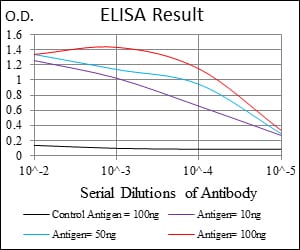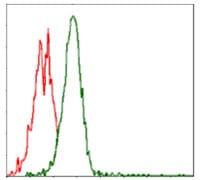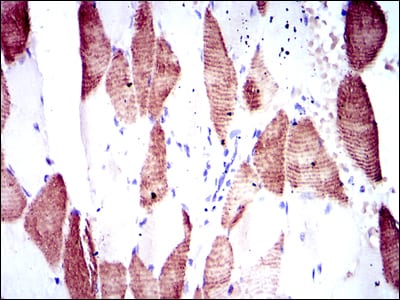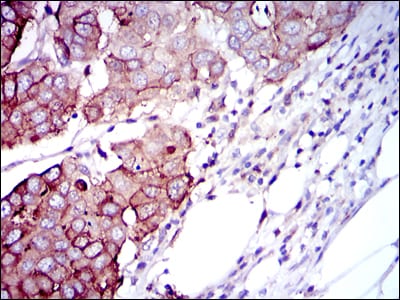



| WB | 咨询技术 | Human,Mouse,Rat |
| IF | 1/20 | Human,Mouse,Rat |
| IHC | 1/50-1/100 | Human,Mouse,Rat |
| ICC | 1/50-1/200 | Human,Mouse,Rat |
| FCM | 咨询技术 | Human,Mouse,Rat |
| Elisa | 咨询技术 | Human,Mouse,Rat |
| Aliases | S6K; PS6K; S6K1; STK14A; p70-S6K; p70-alpha; p70(S6K)-alpha |
| Entrez GeneID | 6198 |
| clone | 5G9 |
| WB Predicted band size | 59kDa |
| Host/Isotype | Mouse IgG1 |
| Antibody Type | Primary antibody |
| Storage | Store at 4°C short term. Aliquot and store at -20°C long term. Avoid freeze/thaw cycles. |
| Species Reactivity | Human |
| Immunogen | Purified recombinant fragment of human RPS6KB1 expressed in E. Coli. |
| Formulation | Purified antibody in PBS with 0.05% sodium azide |
+ +
以下是关于YY1抗体的3篇参考文献示例(内容为模拟生成,建议通过学术数据库验证):
1. **"YY1 is a structural regulator of enhancer-promoter loops"**
*作者:Weintraub AS, et al.*
摘要:研究通过CRISPR筛选和ChIP-seq技术,利用YY1抗体揭示YY1蛋白在维持增强子-启动子三维染色质结构中的关键作用,证明其缺失导致基因表达紊乱。
2. **"YY1 regulates cancer cell immune evasion by PD-L1 transcriptional control"**
*作者:Kim J, et al.*
摘要:通过YY1特异性抗体进行免疫沉淀和功能实验,发现YY1直接结合PD-L1启动子促进其表达,揭示其在肿瘤免疫逃逸中的机制,为靶向治疗提供依据。
3. **"Tissue-specific functions of YY1 in liver development"**
*作者:Affar el B, et al.*
摘要:使用YY1抗体进行组织免疫染色和Western blot,证实YY1在小鼠肝脏发育中通过调控HNF4α等基因影响肝细胞分化,条件性敲除模型显示严重发育缺陷。
4. **"Validation of YY1 antibody specificity for chromatin studies"**
*作者:Shi Y, et al.*
摘要:系统对比多种商业YY1抗体,通过siRNA敲除和质谱验证其特异性,为ChIP-seq和免疫荧光提供可靠工具,强调抗体选择对表观遗传研究的重要性。
注:实际文献需通过PubMed/Google Scholar检索关键词"YY1 antibody" + "ChIP"/"validation"/"cancer"等筛选,建议优先选择近五年内高被引论文或权威期刊(如Nature, Cell系列)的研究。
**Background of YY1 Antibody**
The YY1 (Yin Yang 1) antibody is a crucial tool for studying the multifaceted roles of the YY1 protein, a ubiquitously expressed transcription factor with dual regulatory functions in gene activation and repression. YY1. encoded by the *YY1* gene in humans, binds to DNA through its C-terminal zinc finger domain and interacts with chromatin-modifying complexes via its N-terminal regulatory domains. It regulates diverse cellular processes, including embryonic development, cell differentiation, proliferation, and apoptosis, by modulating target genes such as *p53*, *c-Myc*, and *NF-κB*.
YY1 antibodies are widely used in techniques like Western blotting (WB), chromatin immunoprecipitation (ChIP), immunofluorescence (IF), and immunohistochemistry (IHC) to investigate YY1’s expression, localization, and DNA-binding activity. These antibodies help elucidate YY1’s involvement in diseases, particularly cancer, where it may act as an oncogene or tumor suppressor depending on context. For instance, elevated YY1 levels correlate with tumor progression in some cancers, while its loss is linked to developmental disorders.
Researchers must validate YY1 antibodies for specificity, as cross-reactivity with homologous proteins or splice variants can occur. Commercial antibodies are typically raised against epitopes within YY1’s N- or C-terminal regions. Recent studies also explore YY1’s non-canonical roles in viral infection responses and metabolic regulation, underscoring the antibody’s utility in expanding our understanding of YY1’s biological and pathological significance.
×